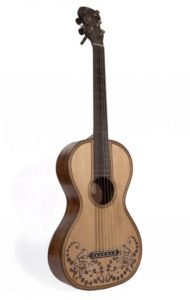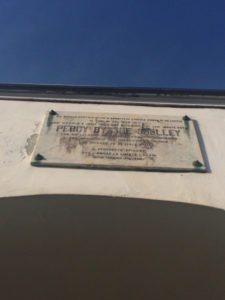Reflecting on Shelley’s late lyrics: Ana Stevenson on "The Serpent Is Shut Out from Paradise"
"Poetic Reflections" is a new, experimental Blog series in which we invite readers to re-introduce, re-read, or reflect upon a text by an author from the Keats-Shelley Circles. We encourage our members and followers to send in their own reactions to that reading. We welcome contributions to this series, so please do get in touch if you’d like to get involved and share your ideas with us. Today we present a post by Ana Stevenson musing on Shelley’s final years and his relationship with Jane Williams."The Serpent is Shut Out from Paradise" by Ana StevensonToward the end of his life, Percy Bysshe Shelley composed at least eleven poems that have been identified as inspired by or dedicated to Jane Williams. Jane, like Shelley, had left her first spouse for someone else. She was well-read and a talented musician – such qualities would prove that she was not only a pleasant companion, but someone who contributed to a household of gifted individuals. Shelley, along with his wife Mary Wollstonecraft Shelley, had been traveling around Italy, and eventually settled with Jane and her partner Edward Williams in a villa in Lerici – the Casa Magni. Here the families cohabited until the tragic death of Shelley and Williams in a sailing accident. During the time spent in Italy, Shelley’s relationship with his wife was affected by the loss of their children, William and Clara, as well as a frightening miscarriage. These events have been blamed on the arduous conditions of the Shelleys’ traveling, as both mother and children were in poor health and in need of rest. As suggested by the Shelley biographer Richard Holmes, Mary’s unhappiness and Shelley’s apparent lack of concern put a strain on their relationship.In this period, Shelley turned his attention to Williams’ wife Jane, presenting her with musical instruments, such as a flageolet and a guitar - the latter is currently residing at the Bodleian Library, University of Oxford - and writing her lyrics and poems. Sometimes these would be handed straight to Jane’s husband, who would read them with his wife on the author’s request – however, the poetry contained many insinuations, and it has been suggested that Shelley veiled his feelings in this way in order to avoid raising suspicions of an affair.
Shelley, along with his wife Mary Wollstonecraft Shelley, had been traveling around Italy, and eventually settled with Jane and her partner Edward Williams in a villa in Lerici – the Casa Magni. Here the families cohabited until the tragic death of Shelley and Williams in a sailing accident. During the time spent in Italy, Shelley’s relationship with his wife was affected by the loss of their children, William and Clara, as well as a frightening miscarriage. These events have been blamed on the arduous conditions of the Shelleys’ traveling, as both mother and children were in poor health and in need of rest. As suggested by the Shelley biographer Richard Holmes, Mary’s unhappiness and Shelley’s apparent lack of concern put a strain on their relationship.In this period, Shelley turned his attention to Williams’ wife Jane, presenting her with musical instruments, such as a flageolet and a guitar - the latter is currently residing at the Bodleian Library, University of Oxford - and writing her lyrics and poems. Sometimes these would be handed straight to Jane’s husband, who would read them with his wife on the author’s request – however, the poetry contained many insinuations, and it has been suggested that Shelley veiled his feelings in this way in order to avoid raising suspicions of an affair. One poem, "The Serpent Is Shut Out from Paradise," was previously known as "To Edward Williams" as it was enclosed with a surviving note requesting that no one but the receiver – and perhaps his wife – should read it. The stanzas were given by Shelley to Williams on 26 January 1822. The opening stanza portraits an abandoned, "widowed" (l. 4), individual who, surrounded by pain, can now only see happiness as enjoyed by his friends.
One poem, "The Serpent Is Shut Out from Paradise," was previously known as "To Edward Williams" as it was enclosed with a surviving note requesting that no one but the receiver – and perhaps his wife – should read it. The stanzas were given by Shelley to Williams on 26 January 1822. The opening stanza portraits an abandoned, "widowed" (l. 4), individual who, surrounded by pain, can now only see happiness as enjoyed by his friends.
Dear friends, dear friend, know that I only flyYour looks, because they stirGriefs that should only sleep, and hopes that cannot die. (ll. 18-20)
Line 18 moves from addressing both Edward and Jane, to speaking only to her, the one he desires and, it is implied, the source of his sorrow. In the poem, the snake who has been excluded from paradise can be read as Shelley himself, deprived of happiness:
When I return to my cold home, you askWhy I am not as I have lately been? (ll. 25-26)
It has been suggested by some of Shelley’s biographers, including Holmes, that at this point his marriage is no longer a happy one. His grieving and distant wife Mary has turned home into an undesirable place to be. Seeking peace beyond Jane has proven fruitless: "I sought / Peace thus, and but in you I found it not" (ll. 31-32). Even his friends are a contributing factor for his agony.
The sleepless billows on the ocean’s breastBreak like a bursting heart, and die in foam,And thus at length find rest:Doubtless there is a place of peaceWhere my weak heart and all its throbs will cease. (ll. 44-48)
Death is the outcome that could bring the speaker peace. The preceding lines describing restless nights by the sea prior to death are another biographical component of this poem.
Full half an hour, to-day, I tried my lotWith various flowers, and every one still said,‘She loves me–loves me not.’And if this meant a vision long since fled–If it meant fortune, fame, or peace of thought–If it meant,–but I dreadTo speak what you may know too well:Still there was truth in the sad oracle. (ll. 33-40)
If the speaker is Shelley, what we can imagine here is that he cannot help indulging in the idea that Jane loves him, but the reflection is a sad one, as he is fully aware that his friends are content in their marriage. After the poet’s death, the widowed Jane Williams would repeatedly talk about Shelley’s feelings for her. Some readers and scholars believe that his love for Jane was purely platonic, finding in her the lively qualities that he hoped would return in Mary Shelley. At this stage in their lives, Shelley was aware Mary was overtaken by grief, and this might have lead the poet to project his desires elsewhere. He wrote in a letter of 18 June 1822: "I only feel the want of those who can feel, and understand me. Whether from proximity and the continuity of domestic intercourse, Mary does not."


Others suggest that Shelley’s obsession came from repressed sexual desires - we can recall the prudish image of Shelley created by the Victorians - and some say that his feelings were undefined or merely based on poetical inspiration. Whatever was the true source of Shelley’s feelings, "The Serpent Is Shut Out from Paradise" and the other poems to Jane Williams (such as "To Jane. The Invitation" and "With A Guitar. To Jane") are incredibly descriptive of what occupied his mind toward the end of his life – his loneliness in his marriage, his yearning for love, his agony, misery, and hopelessness for the future.Shelley’s posthumous reputation in the nineteenth century was heavily reconstructed by omitting his controversial opinions on politics and sexuality. He was made into a poet who presented a discourse on love that was exclusively metaphorical and idealized by the beauty of nature and ancient tales. By looking at the works such as the poems dedicated to Jane Williams, we have a broader perspective of Shelley as a human being affected by grief, marital struggles, and desires; a man whose idea of love was projected onto those around him and his social behavior. And so the poem concludes:
These verses were too sadTo send to you, but that I know,Happy yourself, you feel another’s woe. (ll. 55-56)
Works citedRichard Holmes, Shelley: The Pursuit (London: Harper Perennial, 1974).Donald H. Reiman and Michael O'Neill (eds.), The Manuscripts of the Younger Romantics: Percy Bysshe Shelley Vol VIII (London: Garland, 1997).Percy Bysshe Shelley, The Letters of Percy Bysshe Shelley, 2 vols., ed. Frederick L. Jones (Oxford: Oxford University Press, 1964).Shelley, 'The Serpent Is Shut Out from Paradise' in Shelley's Poetry and Prose, 2nd edition ed. Donald H. Reiman and Neil Fraistat (London and New York: Norton, 2002) pp. 475-76.John Worthen, Shelley Drowns (Colchester: Muscaliet, 2019). Read the K-SAA interview with him.See manuscripts and objects from Shelley's last days via the archived online exhibition Shelley's Ghost, here.

